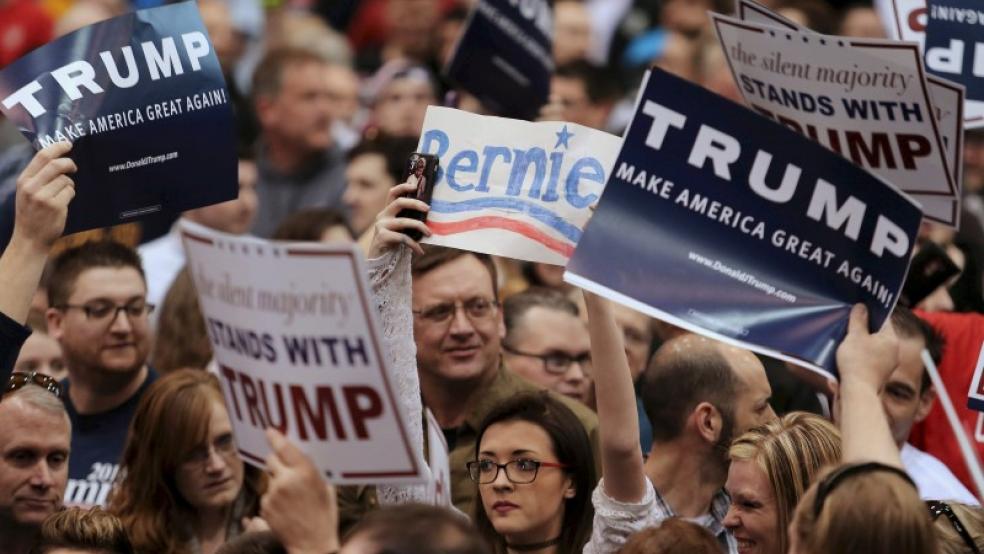Republican presidential frontrunner Donald Trump yesterday in different interviews laid out his vision for a transformation of the role the United States plays in assuring the security of its friends and allies. Under a Trump administration, the US would look less like the world’s policeman, and more like the world’s rent-a-cop.
Trump has been making many Americans nervous for months now, with speeches that stir up racial and religious animosities and policy pronouncements in areas like immigration and international trade that don’t mesh with either actual or political reality.
Related: New Levels of Chutzpah from Trump in DC
In recent weeks, the worry about Trump as a potential president has infected US allies. Diplomats contacted by the Washington Post recently confessed deep concerns about how their country’s relationships with the US would survive a Trump presidency.
Yesterday, as though determined to bring that simmering concern to a rolling boil, Trump suggested that the United States needs to back off its commitment to the North Atlantic Treaty Organization, the mutual defense association that has largely kept the peace in Europe since the end of the Second World War.
While he didn’t go as far as suggesting that the US actually withdraw from the alliance, he sent mixed signals in interviews with the Washington Post editorial board and then later, in an interview with CNN’s Wolf Blitzer about what he thinks the US commitment to the alliance ought to be.
“NATO was set up at a different time,” he told The Post. “NATO was set up when we were a richer country. We’re not a rich country. We’re borrowing, we’re borrowing all of this money… NATO is costing us a fortune and yes, we’re protecting Europe but we’re spending a lot of money.”
Related: Arizona and Utah Provide First Big Test of the ‘Stop Trump’ Movement
“Number one, I think the distribution of costs has to be changed. I think NATO as a concept is good, but it is not as good as it was when it first evolved. And I think we bear the, you know, not only financially, we bear the biggest brunt of it.”
While the US does shoulder the largest share of the burden for funding NATO, the cost is not as overwhelming as Trump seemed to suggest. The roughly 22 percent of NATO $2.1 billion in operating costs that the U.S. provides came to less than half a billion dollars in 2016.
NATO’s operating expenses don’t tell the whole story – or even most of it. The largest expense incurred by member countries is related to the deployment of troops. But even there, the amount the US spends on helping to defend Europe, while large, is only a tiny sliver of the overall defense budget.
The Defense Department last month announced that it would ask Congress to quadruple the amount of money it spends on its European Reassurance Initiative, which aims to keep a “persistent air, land, and sea presence” in the region. The increase is primarily in response to the growing aggressiveness of Russian in the east. Even that fourfold increase would bring spending on the project up to only $3.4 billion in 2017 – less than one percent of the total US Defense budget.
Related: Tuesday Primaries Could Push Trump to Do the Unthinkable: Ask for Help
In both interviews yesterday, Trump repeatedly returned to the idea that the US ought to be financially compensated for providing protection to its allies around the world.
“I don’t think we’re treated fair,” he said in his interview with the Post. “You know, South Korea is very rich. Great industrial country. And yet we’re not reimbursed fairly for what we do. We’re constantly, you know, sending our ships, sending our planes, doing our war games, doing other. We’re reimbursed a fraction of what this is all costing.”
Trump continued, “If you look at Germany, if you look at Saudi Arabia, if you look at Japan, if you look at South Korea — I mean we spend billions of dollars on Saudi Arabia, and they have nothing but money. And I say, why? Now I would go in and I would structure a much different deal with them, and it would be a much better deal.”
Trump’s tendency to see everything in transactional terms appears to extend to the issue of international security. Under a President Trump, it seems, the US would not pursue global stability and international peace as goods in themselves, but rather as things that are optional – worth having, but only if the price is right.





